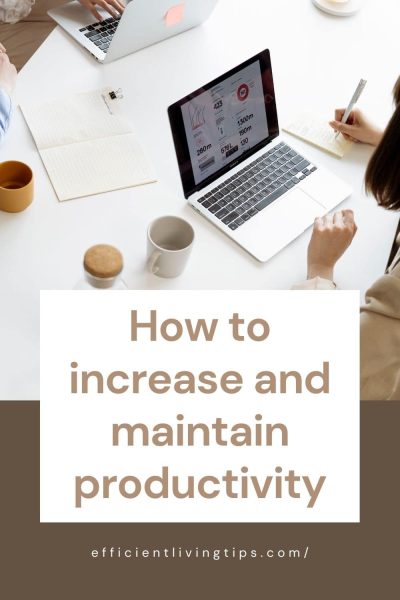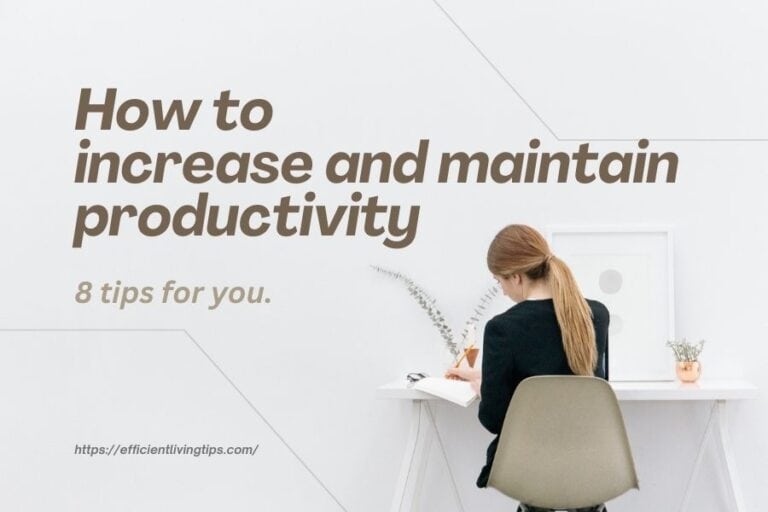Productivity is used as a measure of efficiency and is often defined as The general definition of productivity is the relationship between actual (physical) output and inputs.(Rosekind, M et al., 2010)
What is personal productivity?
Personal productivity is the effective personal management of your time, energy and resources to achieve your goals.
Personal productivity is not limited to work, it also applies to all aspects of life, such as interpersonal relationships, leisure and entertainment, etc. About the optimization of all aspects of life and achieving a balance between life, leisure and work.
Why is increasing the personal productivity so important?
Do you often feel like you could have done more or have a sense of wasting your time at the end of the day?
Always feel like there’s a bunch of things at hand, often like balls of yarn tangled together in a mess, always getting stuck here and having issues there.All sorts of little hiccups make it tough to stay on track and successfully reach the goals.
Failure to meet the standards at work affects life and leisure because you have to make up for a pile of unfinished work, sacrificing your leisure time. The imbalance between work and life has become the source of anxiety and stress, making us gradually become exhausted, and so on, falling into a vicious circle.
Improving personal productivity in smart ways not only creates a better work-life balance but also allows us to lead more fulfilling lives. Here are a few tips to help you boost your productivity.

1.Get enough sleep
Have you ever felt exhausted when you need to stay highly concentrated to complete a task? Your energy starts to drop while you’re in the midst of it. And you find yourself needing to deliberately get up and walk around to boost your energy. This is especially true when the work at hand isn’t finished, disrupting the flow of your work. Often, a lot of time is wasted in the process of standing up, moving around, and trying to regain a working rhythm.
Indeed, studies have shown that sleep disorders can lead to reduced employee productivity, resulting in high costs for employers. (Rosekind, M et al., 2010)
It often takes enough energy to stay focused and have a clear mind to think and plan for the next day.
2.Maintain a regular daily routine
This doesn’t necessarily mean you have to go to bed early and get up early! Maybe going to bed early and getting up early works best for some. But if you’re a designer who finds inspiration and works best in the dead of night, that’s okay too.
The most important thing is to keep a consistent routine! If you’re accustomed to staying up late and rising late(In situations), then stick to that schedule, as long as you can maintain your health and energy. Keeping a consistent schedule is also a way to stay disciplined. I mean, if you can’t even get your work and rest in order, how can you stick to any kind of routine?
3.Take a moment to settle in and clarify the task at hand.
Whether it’s work tasks or personal to-dos, there’s always a mountain of stuff, leaving you wondering where to start.
Before diving in, write down your goals for the day and classify the tasks. With tasks organized, slot them into your daily time management schedule!
You can also try breaking down big goals into smaller tasks, helping you tackle them step by step!
4.Eliminate distractions
Have you ever been interrupted in the middle of a task, causing your workflow to be disrupted? Sometimes, you might even forget where you left off or what you need to do next. As a result, you end up spending more time and effort trying to regain your focus and rhythm. Distractions and interruptions at work tend to reduce our concentration and productivity.
To reduce these distractions, you can try eliminating common sources of distraction around you. This could involve using the focus mode on your mobile phone to eliminate unnecessary notifications, limiting social media use to fixed times, or using apps to assist with concentration (such as Forest: Focus for Productivity).
Alternatively, you can set aside specific focus times where all sources of interference, including phone calls, messages, and emails, are kept away from you for a certain period of time.
5.Find the right time management method
There are many time management methods in the market, such as bullet journaling, the Pomodoro technique, perceptual focus time management method, etc. Find a time management method that suits your characteristics and work attributes. If you are hesitant, try starting with your favorite method.
After continuous operation, remember to review the actual situation in a timely manner and adjust it to a state that matches the current situation at any time.
6.Use productivity tools
Proper use of the right tools can improve work efficiency and increase productivity. Here are a few for your reference:
- Notebook Apps: GoodNotes is an iPad-specific notebook app that is highly suitable for personal calendars. There are many free and paid personal calendar apps available for download and purchase.
- To-do list APP: Todoist, TickTick, Microsoft To Do, Google Tasks, Any.doProject management tools: Notion, Trello, Google Calendar, ClickUp
7.Develop good habits
Successful and highly effective people often possess many good habits that help them achieve their goals. The benefits of cultivating good habits are evident.
If you’re still unsure how to cultivate habits, you might consider reading some books to help yourself, such as “Atomic Habits (click to see)” and “The 7 Habits of Highly Effective People (click to see).”
8.After working hard, it's important to also balance leisure activities.
Moderate stress relief is essential.Excessive stress can negatively affect physical health, such as the gastrointestinal tract, thereby reducing productivity. However, it’s crucial to choose the right leisure activities. As engaging in the wrong ones may lead to results that fall short of expectations.
In addition to yourself, the surrounding environment is also important
Create a workspace where you feel comfortable and can focus. Invest in an ergonomically comfortable chair if you need to sit for long periods. And consider purchasing a keyboard and mouse that suit your needs. These adjustments can enhance comfort and efficiency, ultimately boosting productivity.
You can also benefit from motivational cards. Place them where you can see them when you take breaks or move around, providing a source of inspiration and positivity.

